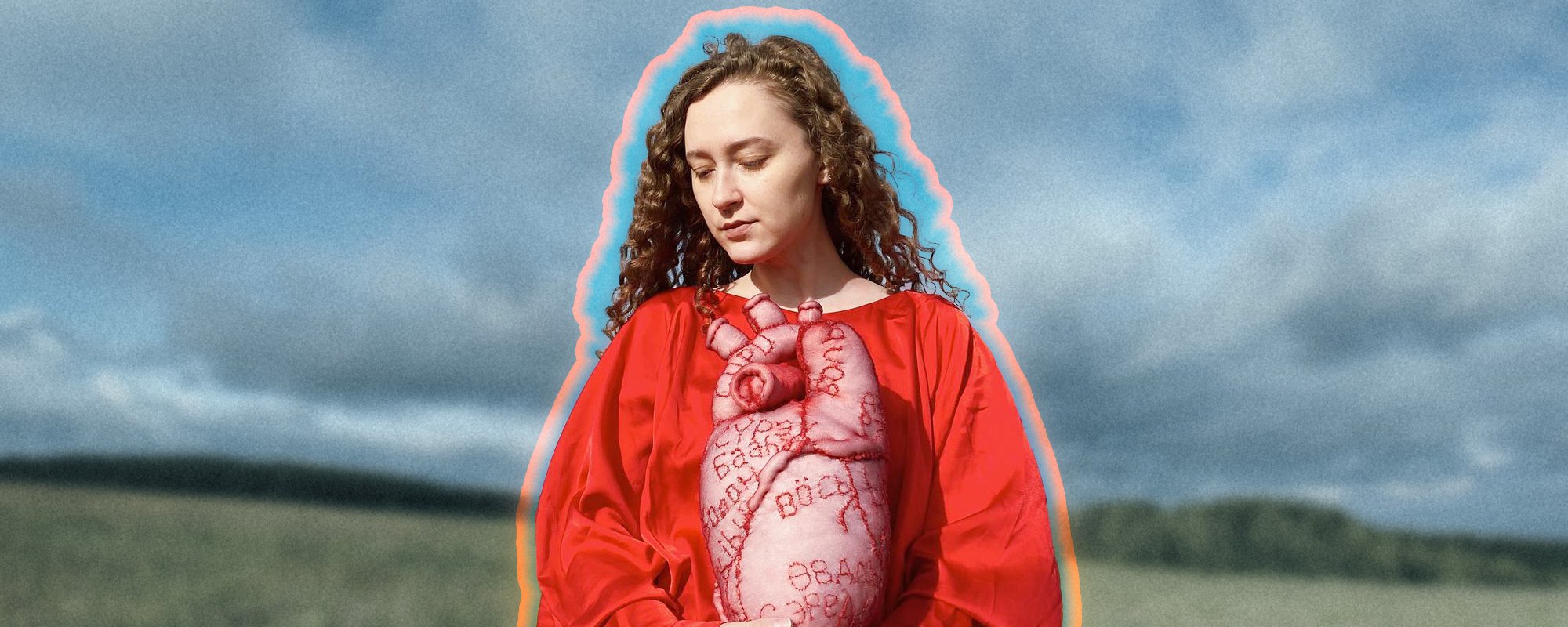Alisa Gorshenina is an artist from Nizhny Tagil, a city just east of the Ural Mountains in Russia. In her work, she touches on the theme of Ural mythology and explores local identity. Since the beginning of the full-scale invasion, the theme of war has appeared in all of her pieces — something that nationalist, pro-war Russian activists (referred to as «Z-activists» in Russian) have not ignored. Over the past week, several denunciations have been written against Alisa, a workshop she was leading master class at the Yeltsin Center (a cultural and educational centre in Yekaterinburg, the closest large city to Nizhny Tagil) was cancelled, and pro-government bloggers have organised a harassment campaign. We discussed this all with Alisa.
«The pressure has been constant»
A young woman with long, curly hair walks through the snow, black fabric with a scattering of white letters trailing behind her. This woman is Alisa Gorshenina, an artist from Nizhny Tagil. The letters form the phrase «We are against war». For this display, Alisa created a costume featuring these words in languages of various ethnic groups in Russia. A month later, on 1 May 2022, she unveiled a second piece — a white garment with wide wings and the word «Peace» written in black paint in Avar, Karelian, Chuvash, and other languages.
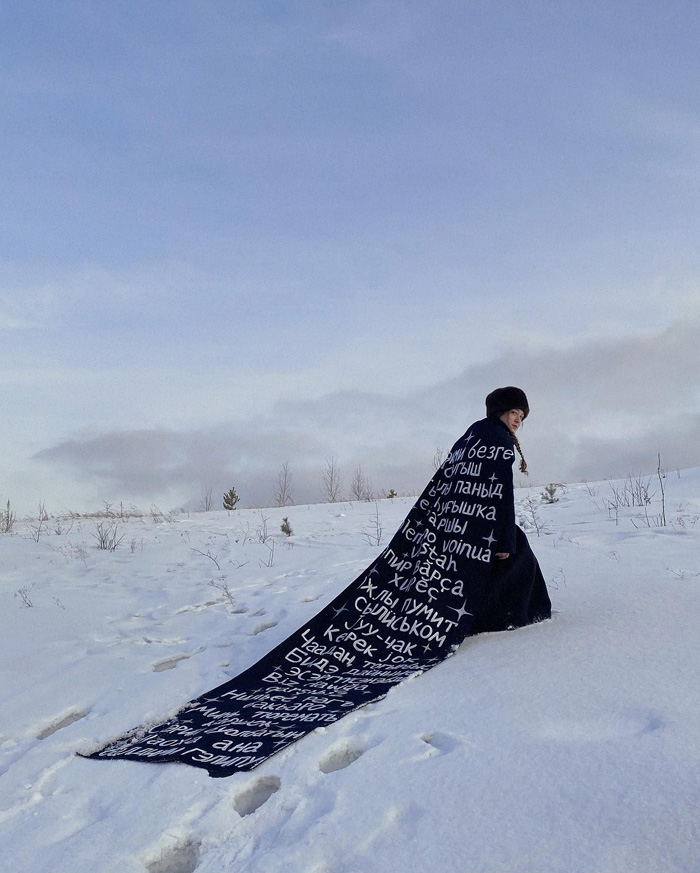
«My art is a reflection of what is happening, always filtered through me», says Alisa. «The war immediately affected my work, because I was too shaken up. My art reflects my entire life, and if my life changes, so does my art.
Sometimes people call me an anti-war artist, but I don’t like clichés and labels. I don’t aim to shout slogans; my goal is simply to be honest. I talk about what matters to me — being a Russian woman inside a country that started a war».
The artist staged her first anti-war protest on 24 February 2022. Late that evening, Alisa went to Fox Mountain (located in the city centre) — from there, you can see the entirety of Nizhny Tagil. Here, in a solitary picket, she put up a banner with a dove and the message «No to war».
After that, Alisa went out onto the city streets in a coat with the inscription «No to War». In mid-April 2022, an offence record was drawn up against her for «discrediting» the Russian army (Article 20.3.3 of the Administrative Offences Code) — on that day, the artist stood in black clothing with a white rose in her hands near a children’s centre named «Peace». Ribbons with the inscriptions «Эпир вӑрҫа хирӗҫ!» and «Кирәкми безгә сугыш!» extended from the flower — which, translated from Chuvash and Tatar, mean «We are against war!». Alisa was fined 35 thousand rubles (US$408) for this photo.
«The pressure on me has been constant», says Alisa, «since 25 February 2022, when my first solitary picket was reported in the media. In 2022, I had an exhibition at the Yeltsin Center, which irritated Nikita Mikhalkov (a well-known Russian filmmaker, active in Russian politics) and his television show „Besogon“ (named after Mikhalkov’s patron saint). He wrote about my exhibition, saying that they were showing some kind of abomination there, using information from a ridiculous website which went viral by stating that the exhibition featured „gutted taxidermied animals and sewn human organs“. At that time, pro-government activists wrote a lot of articles about it, but there weren’t any serious confrontations».
On 1 November last year, the group Pussy Riot released a music video to the song Swan Lake, in which the band’s members condemn Russian propaganda and call for the return of Ukrainian children who have been taken to Russia since the beginning of the war. Alisa created the visual styling for this video and designed the costumes in her artistic style. Her name is listed in the credits of the video.
«At that point, I decided that not hiding my name would be the right choice. This is my stance, I did not want to hide behind a pseudonym», the artist explains. «Those who know me would still recognize my works because they feature images characteristic of my art. I had doubts about whether to reveal my name. I always have doubts and fears — in my opinion, this is the most logical reaction for someone who is currently in Russia. I do not want people to think of me as a heroine.
After the music video was released there were some negative reactions, but not as many as we get today. Pro-government online communities wrote about it, but as soon as another artist who did something «bad» turned up, attention was shifted towards them».
«Thinking up the reason for denunciation»
Government oriented activists again surfaced the music video for Pussy Riot’s song when the Yeltsin Center announced Alisa’s felt embroidery workshop. The event was set for 1 June, with an age restriction of 16 and above. One of the first disgruntled posts was published by an activist from Yekaterinburg, Ekaterina Ipatova, who called the artist a «psychopath» on her telegram channel «ИпатоVа» («IpatoVa»). When OVD-info’s correspondent asked the woman to comment on her resentment, Ipatova responded with:
«Present yourself properly: you are not a journalist, but a representative of an extremist-terrorist group. And since the law on journalism doesn’t apply to you, but rather the law regarding extremist and terrorist activity does, you cannot speak with me prior to speaking with the prosecutor and court. I would rather not disrupt the appropriate sequence of events».
Another person who posted about the event in the Yeltsin Center is «Zergulio» — a blogger named Sergey Kolyasnikov from the social movement «Zov naroda» [«Call of the people»]. The movement reached out to the FSB, the prosecutor general’s office, and the Ministry of Culture with the demand to «conduct an inspection». Kolyasnikov ignored OVD-info’s request for comment.
«Before all this started I was doing alright», Alisa recounts. «I had finished therapy — I had come out of my chronic depression. A new life had begun, summer was around the corner. It’s quite hard to do a shoot in the winter, summer is the time when my artworks get to breathe, and I let them go outside. Then things became difficult, especially because of the realisation that I might have to leave [Russia] in the near future. The uncertainty weighs on me. I found relief in meeting with friends: we talked through my hardships, discussed everything and in the process I came to a conclusion that I would feel much better if I made a definite decision to stay».
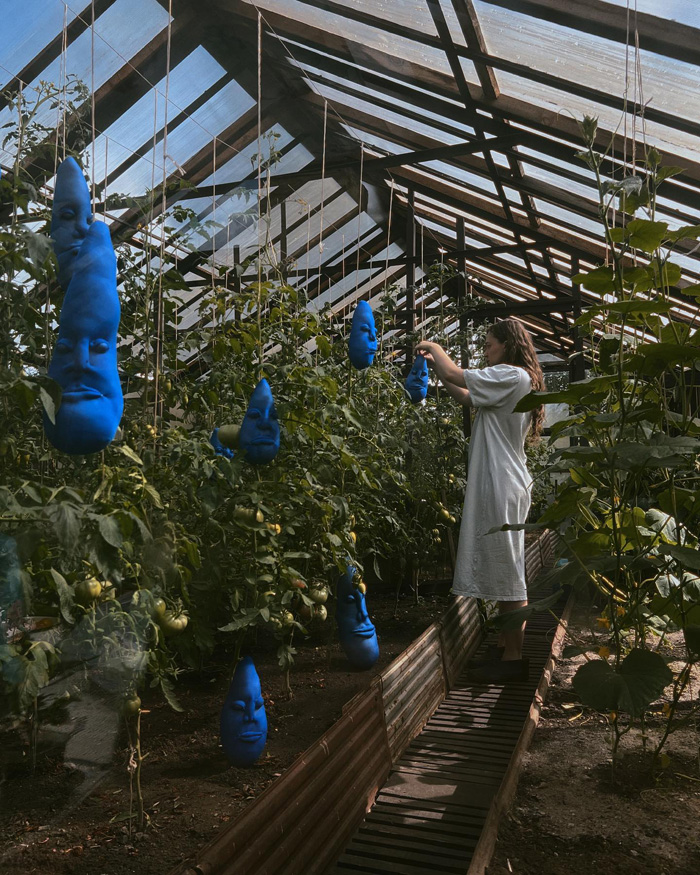
«It might sound strange, but once I announced this decision publicly on Instagram, I felt a weight being lifted off my shoulders. People began to offer support, which helps a lot. I feel supported by the place I’m in, however strange that might sound, and I felt massively supported by my parents’ reaction. We have very different points of view. I took part in Andrey Loshak’s film „Broken ties“ alongside my mother, which shows how families are divided because of different views [on the war]. I was afraid my parents would accuse me of something, but now we are united — they supported me so much that now nothing seems scary anymore. I feel immensely bolstered by their support».
The appeals of all the activists resulted in Alexander Drozdov, the Yeltsin Center executive director, receiving a warning from the prosecutor’s office of Yekaterinburg framed as a «preventative measure for possible extremist activity».
«This master class was planned for May», explains Alisa, «but I was ill and we had to reschedule it to the first of June. This is International Children’s day (a holiday in Russia), which I think was the main trigger [for the activists]. People must have thought this event was for kids, even though it was supposed to be adults only, and no kids would have been allowed.
This master class was focused on mother-daughter relationships, because there was an exhibition with a similar theme in the Yeltsin Center. I am 30 years old, I also have a mum and I can talk about a mother-daughter relationship with her, you don’t need to be a child for that. Unfortunately pro-government media conflated the fact that I stand against the war and have something to say with the fact that it was the first of June. They misinterpreted everything to the point where I became a «fascist» who intended to teach children inappropriate things.
When it comes to children, our society tends to be so protective over them. But at the same time the people who assumed I was hosting an event for kids and wrote a denunciation about it don’t seem to mind kids lined up in the form of the letter Z (a militarist, pro-war symbol in Russia)».
On 28 May, it emerged that the Yeltsin Center had cancelled the event. Alisa says it’s understandable.
«There are a lot of good people working at the Yeltsin Center who keep doing important things for the Urals despite everything that is happening. I have a lot of connections with this place and I don’t have any hard feelings towards them. I don’t see this as a betrayal and hope we can keep working together, though right now, I can’t predict and don’t know what will happen next. Right now, there’s no point in seeing enemies among those who care about me. I know who truly wishes me harm, and it’s definitely not these people [from the Yeltsin Center]», she says.
«I’m not suicidal»
«Now, the pressure on me has greatly increased», says Alisa. «It has reached a whole new level. This time, there’s a new and difficultsituation. The pressure from people who don’t agree with me is not surprising, since we’re different, and they act as I expect them to. But after my last post, people who shared my views started pressuring me. They feel it’s necessary to invade my personal space and tell me to leave [the country], giving a lot of ‘needed’ advice.
Lots of people have commented and sent me messages saying that I’m naive and foolish, and that I’m making my decision [to stay in Russia] based on emotions. So, I want to make it clear that I don’t think I’m foolish. I wonder if they’d say the same if I were a man, or if they’d call me ‘a brave guy’. It irritates me that I’m accused of being excessively emotional. I see the situation clearly and fully understand the risks. I’ve been through a lot recently and can’t just ignore that. My life has changed dramatically, and so has the life of my loved ones and my whole family who are concerned about me.
This isn’t a «suicidal act», as people are saying, and it doesn’t mean I’ve given up on myself. I’m not suicidal. I realise my chances of staying here are shrinking. It feels like a tightening grip around my neck with all my exhibitions and art projects being cancelled. Right now, I can count on one hand the number of galleries still willing to work with me. Almost no one can, because it’s too risky. Every day, there seem to be fewer and fewer opportunities. I see and understand this: everything points to the fact that I should leave, but I want to make that choice for myself.
This country is just as much mine as it is the country of the people who are harassing me. Why do I suddenly have to leave just because they don’t like something? Obviously, as a rationally-minded person, I understand that I might be pushed out. It has been going on for a while, but the more they try to bring me down, the more determined I am to stay, like a tree that grows stronger out of spite».
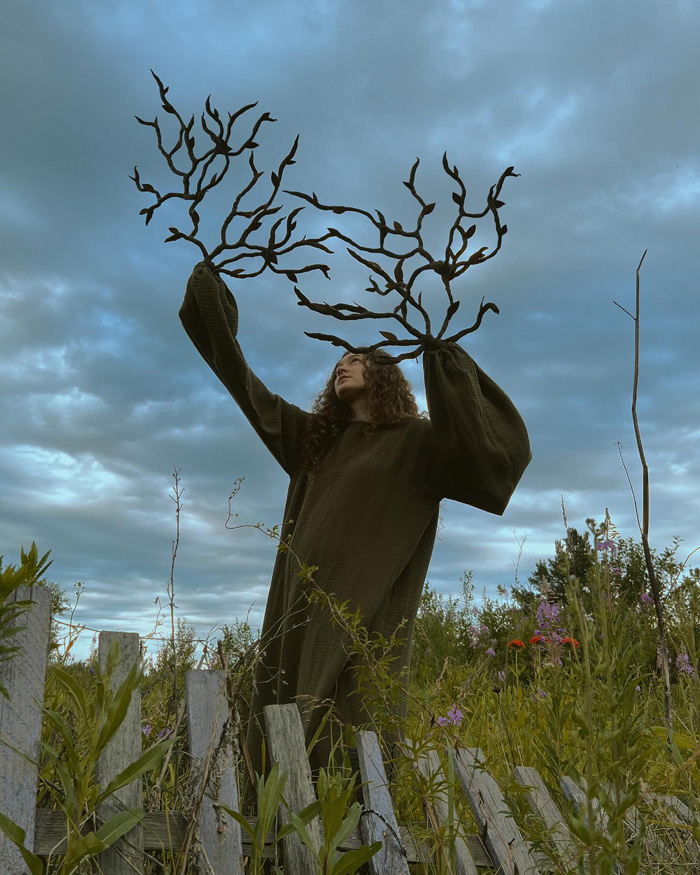
«People keep suggesting that I move somewhere. I don’t want to seem naive or foolish, but this is my home. Why do I even have to find the reasons to stay? It always feels like I need to come up with some elaborate reason for everyone, even for people who understand me, as if just saying I like it here and don’t want to leave isn’t enough. It makes me so sad.
I really need help but not the kind they suggest. I’ve possibly never had so many offers to leave: so many prospects, residencies, and opportunities, and the more they appear, the less I want to leave. However, I don’t want people to shut me out because of this. I’m worried they’ll think I’m crazy and don’t want to grow, so they shouldn’t work with me, since I’ve chosen to «die in Russia».
It’s super important for me to stay connected, keep working and collaborate. Right now it’s incredibly important, because there are almost no opportunities left in Russia to showcase my art, and I won’t even mention making money. The last thing I want is to cut ties with the world».
«The village has deeply defined me»
«I understand perfectly well that my husband and I could leave and settle elsewhere, but for now, I want to stay here», the artist explains. «It feels as though I interact with something alive wherever I go here. Tagil feels like a living city to me. I truly love its layout, enjoy the abundant nature here, and have my favourite spots that I always want to visit. I travel around this area frequently.
Around Tagil, there are many villages and small towns. I really enjoy visiting and exploring them. There are many things here that I find interesting to work on. For example, in the city centre, there is Fox Mountain — I shoot many projects at this location. It is very important to me.
I enjoy interacting with the places around me because I sense an artistic potential in them. I don’t want to leave Russia until I’ve completed a major project related to the village where I was born, lived during my childhood, and returned to every summer. The village has deeply defined me; I was shaped by its rural environment, and it has had a profound impact on me.
Recently, I celebrated my birthday and I went there on an artistic expedition. There are many abandoned houses, and I enjoy incorporating my works into them, intertwining something that is dying with something that is living, and creating contrast. I see great strength in this, and it affects me. There are many such villages here in the Urals—I want to be close to them, to fill their emptiness. Abandoned, empty houses inspire me, and I constantly feel the urge to touch them».
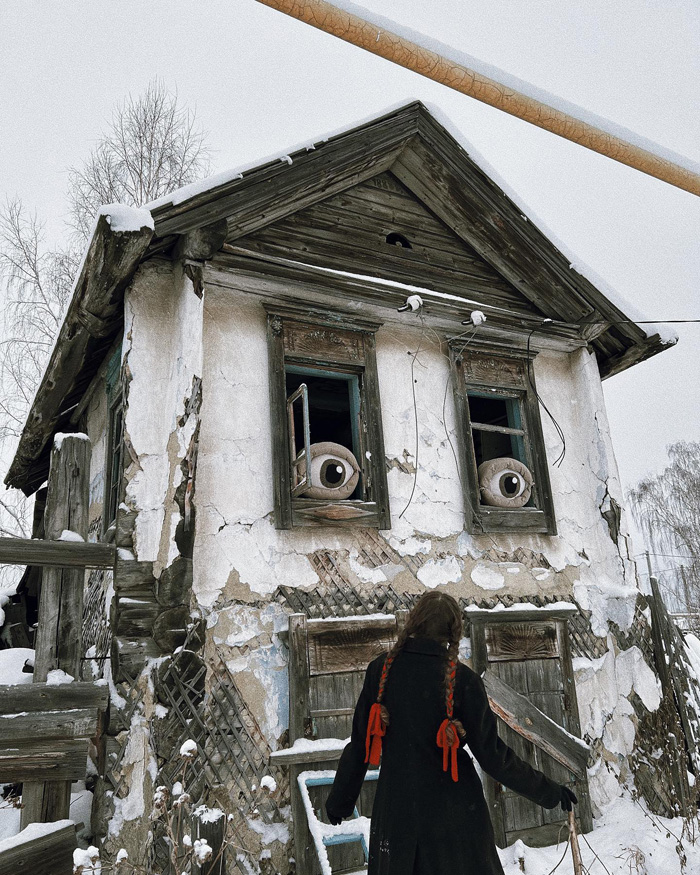
«Defiance is another reason I choose to stay: whenever they say „Leave“, my response is, „I won’t.“ For the past week, I’ve been asking myself several times a day why I am here. I always strive to show an alternative: before the war, artists typically moved to Moscow and St. Petersburg, whereas Tagil is not associated with art, even though we have an incredible number of artists and a very prominent local art school. When everyone was leaving for Moscow, I wanted to shout that there is Nizhny Tagil too, and I am here!
Art exists throughout Russia, in every region, in small towns, settlements, and villages. I want to show through my life and approach that different things exist, and based on this, people can open their eyes and realise that the world is not black-and-white as they might be used to thinking. When the war started, this desire intensified, and I wanted to show that there are different people in Russia — yes, there are those who support the war, but I am here too. And there are many like me here as well.
Right now, people are texting me to say that «All the decent people have left». This hurts me deeply. It is terrible and extremely painful. I have so many friends here, so many good people. My heart aches for those who are in Russia because we now read media that reports about us from abroad, and they do not describe us as we truly are.
I feel like we are living under a glass dome that I constantly want to break through. I want to show an alternative. It is not true that «all the decent people have left» — we shouldn’t say that. Incredible people have stayed here, carrying on with their lives. It’s not only figures you see in the media, there are also ordinary people like shop assistants and bus drivers who do not support this regime. There are people here, simply people. It hurts me deeply that the world does not seem to see this. We are still here, living.
I do not expect that all these people will make sacrifices, and I don’t expect it from myself either. If necessary, we will leave. I understand that. We are not victims. We are simply trying to carry on».
Marina-Maya Govzman



